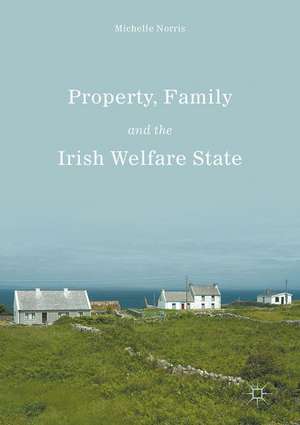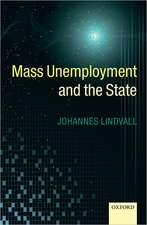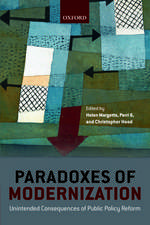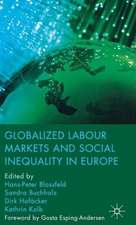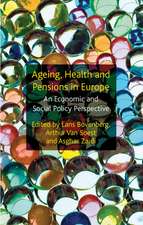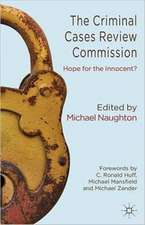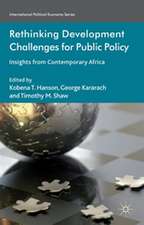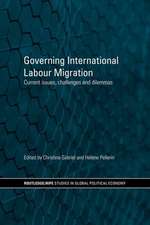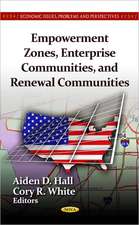Property, Family and the Irish Welfare State
Autor Michelle Norrisen Limba Engleză Hardback – 18 ian 2017
Norris's original line of argument makes the case that Ireland’s regime was distinctive in terms of both focus and purpose in that Ireland’s welfare state was shaped by the power of small farmers and moral teaching and intended to support a rural, agrarian and familist social order rather than an urban working class and industrialised economy. A well-researched and methodical study, this book will be of great interest to scholars of social policy, sociology and Irish history.
| Toate formatele și edițiile | Preț | Express |
|---|---|---|
| Paperback (1) | 781.15 lei 6-8 săpt. | |
| Springer International Publishing – 13 iul 2018 | 781.15 lei 6-8 săpt. | |
| Hardback (1) | 784.13 lei 6-8 săpt. | |
| Springer International Publishing – 18 ian 2017 | 784.13 lei 6-8 săpt. |
Preț: 784.13 lei
Preț vechi: 956.26 lei
-18% Nou
Puncte Express: 1176
Preț estimativ în valută:
150.09€ • 163.09$ • 126.16£
150.09€ • 163.09$ • 126.16£
Carte tipărită la comandă
Livrare economică 21 aprilie-05 mai
Preluare comenzi: 021 569.72.76
Specificații
ISBN-13: 9783319445663
ISBN-10: 3319445669
Pagini: 224
Ilustrații: XIV, 279 p. 26 illus.
Dimensiuni: 148 x 210 x 2 mm
Greutate: 0.5 kg
Ediția:1st ed. 2016
Editura: Springer International Publishing
Colecția Palgrave Macmillan
Locul publicării:Cham, Switzerland
ISBN-10: 3319445669
Pagini: 224
Ilustrații: XIV, 279 p. 26 illus.
Dimensiuni: 148 x 210 x 2 mm
Greutate: 0.5 kg
Ediția:1st ed. 2016
Editura: Springer International Publishing
Colecția Palgrave Macmillan
Locul publicării:Cham, Switzerland
Cuprins
Chapter 1. Introduction.- Chapter 2. Establishment – 1870-1921.- Chapter 3. Construction – 1922-1947.- Chapter 4. Saturation – 1948-68.- Chapter 5. Retrenchment – 1969-89.- Chapter 6. Marketisation – 1990-2007.- Chapter 7. Conclusions.
Recenzii
“Norris’ general explanatory framework is based on the role of power, moral and political legitimacy and efficiency considerations. … Norris provides an innovative, insightful and clearly documented account of the distinctive character of the Irish welfare state.” (Christopher T. Whelan, Journal of Social Policy, Vol. 47 (2), April, 2018)
“This book provides a unique and previously unexamined insight into the development of the Irish welfare system – and offers a new alternative to traditional welfare typologies. … It is essential reading for anyone seeking to understand the contemporary Irish housing sector and the paths that brought it there.” (Anna Carnegie, International Journal of Housing Policy, Vol. 18 (4), December, 2018)
“This book provides a unique and previously unexamined insight into the development of the Irish welfare system – and offers a new alternative to traditional welfare typologies. … It is essential reading for anyone seeking to understand the contemporary Irish housing sector and the paths that brought it there.” (Anna Carnegie, International Journal of Housing Policy, Vol. 18 (4), December, 2018)
Notă biografică
Michelle Norris is Associate Professor in the School of Social Policy, Social Work and Social Justice, University College, Dublin, Ireland.
Textul de pe ultima copertă
"This is a welcome and important contribution to the field of Irish social policy and welfare state studies in general... In elucidating the role of property and land in the development of the welfare state in Ireland and comparing developments in Ireland to those elsewhere, this book takes the analysis of the welfare state into new territory."
Professor Mary Daly, Department of Social Policy and Intervention, University of Oxford.
"Relationships between families and their homes remain the fundament of well-being around which formal welfare state institutions have and continue to be developed. Michelle Norris articulates this with flourish in this volume, managing to unravel the critical interconnections between property, family and welfare that remain as salient in the twenty-first century as they were in the nineteenth. Ireland provides an insightful socio-historic context in which to explore this relationship and is a case that provides good value for the broader analysis of welfare states across developed societies."
Professor Richard Ronald, Centre for Urban Studies, University of Amsterdam.
"Michelle Norris has written an outstanding book on the intertwining of property, housing and welfare state development in Ireland. She makes a bold argument that Ireland’s development path and welfare model can only be understood through the lens of the politics of property. Her fascinating analysis shows that Ireland is another key case in understanding ‘mortgage’ or ‘privatised’ Keynesian political economies. Her book is essential reading for anyone seeking to understand Irish society and economy and for any comparative scholar of the welfare state."
Professor Seán Ó Rian, Department of Sociology, Maynooth University Ireland.
Norris's original line of argument makes the case that Ireland’s regime was distinctive in terms of both focus and purpose in that Ireland’s welfare state was shaped by the power of small farmers and moral teaching and intended to support a rural, agrarian and familist social order rather than an urban working class and industrialised economy. An well-researched and methodical study, this book will be of great interest to scholars of social policy, sociology and Irish history.
Caracteristici
Presents the relationship between property, family and welfare in Ireland Analyses the development of Irish welfare state in terms of the crucial role of property Puts forward a case for a new category of asset-based welfare states Presents detailed historical, case study and statistical data across 150 years of Irish history
